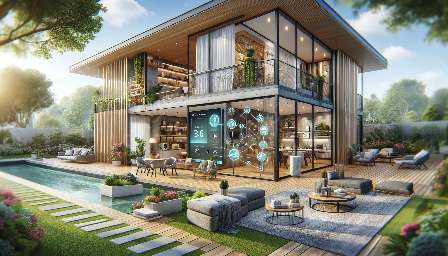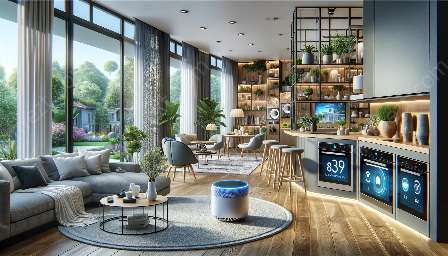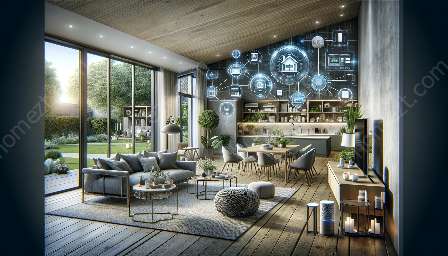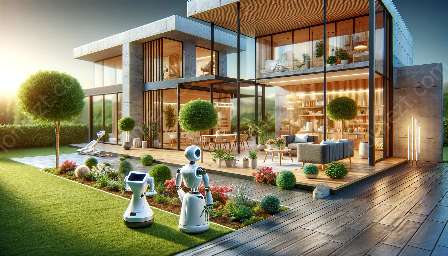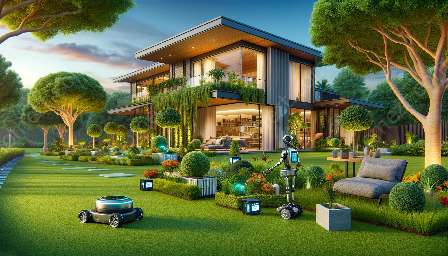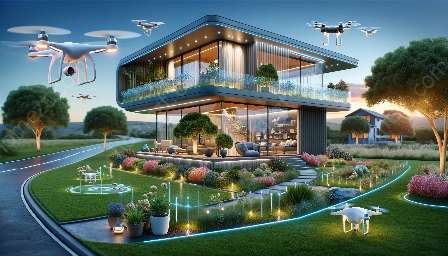Artificial intelligence (AI) is rapidly transforming the way we live, including revolutionizing the design and functionality of our homes. As AI technology continues to advance, it is increasingly integrated with intelligent home design and is shaping the future of home and garden environments.
The Rise of Intelligent Home Design
The concept of intelligent home design encompasses the integration of AI, automation, and smart technologies to create living spaces that are more efficient, convenient, and secure. AI-driven systems are becoming essential components of home design, offering homeowners unprecedented levels of comfort and control while reducing energy consumption and enhancing sustainability.
One of the key features driving the rise of intelligent home design is the adoption of AI-powered home automation systems. These systems utilize machine learning algorithms to understand and adapt to homeowners' preferences, enabling seamless control of lighting, heating, cooling, and security systems. Furthermore, AI-powered devices such as smart speakers and virtual assistants have become integral parts of intelligent home environments, enabling natural language interaction and personalized assistance for various tasks.
Intelligent home design also extends beyond interior spaces to encompass outdoor areas, including garden and landscape management. AI-driven irrigation and maintenance systems can optimize water usage and plant care, contributing to sustainable and eco-friendly home and garden environments.
The Integration of Artificial Intelligence
As AI permeates intelligent home design, innovative applications are emerging to enhance living experiences. AI-powered environmental sensors and monitoring systems enable real-time data collection and analysis, allowing homeowners to optimize energy usage and indoor air quality. Autonomous cleaning robots equipped with AI technology can perform routine household tasks, such as vacuuming and mopping, without human intervention, freeing up time for homeowners to focus on other activities.
Another prominent aspect of integrating AI into home environments is the development of predictive and anticipatory systems. AI algorithms can learn inhabitants' behavioral patterns and anticipate their needs, adjusting environmental settings and automating tasks to provide personalized comfort and convenience. For instance, AI can learn individuals' preferred room temperatures, lighting levels, and entertainment choices to create tailored home experiences.
Furthermore, AI is poised to revolutionize security and safety in homes. AI-powered surveillance cameras and smart locks can analyze data in real time to detect potential security threats and provide proactive alerts to homeowners. Additionally, AI-driven facial recognition and biometric authentication systems offer advanced security measures to safeguard homes and their occupants.
The Future Vision of Home & Garden with AI
Looking ahead, the future of artificial intelligence in homes and gardens holds immense potential for further advancements. AI algorithms are expected to evolve to a level where they can dynamically manage energy resources, integrating renewable energy sources and optimizing consumption patterns to achieve sustainable and cost-effective solutions.
In home design, AI will likely play a pivotal role in personalized wellness and healthcare applications, utilizing biometric sensors and health monitoring devices to provide tailored health and lifestyle recommendations. Moreover, AI-supported home entertainment and immersive experiences are anticipated to deliver enhanced content curation and interactive environments, transforming the way people engage with media and digital content within their homes.
For garden and landscape management, AI is set to enable autonomous robotic systems that can perform precise and efficient maintenance tasks, from trimming and pruning to soil analysis and plant care. AI-driven agricultural technologies may also extend to urban farming and indoor gardening, contributing to sustainable food production within home environments.
Conclusion
The integration of artificial intelligence in homes represents a paradigm shift in the way people interact with and experience their living spaces. With intelligent home design at its core, AI is reshaping traditional concepts of home and garden environments by enhancing comfort, convenience, sustainability, and security. As AI continues to advance, the future vision of AI-powered homes holds the promise of creating personalized, efficient, and enriching living experiences for homeowners and their families.







